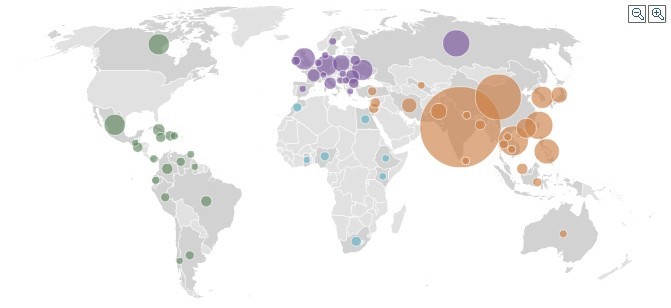
In an increasingly mobile and digital world, the software development industry has been seen to follow suit with other sectors (notably manufacturing) in outsourcing work overseas.
The pattern is familiar. Western countries possess certain production expertise and capabilities that are soon obtained and taught in lesser-developed areas. At the point that the savings in labor rates outweigh potential costs of reduced quality, communication difficulties, or additional transnational expenses, the work is outsourced to the most suitable overseas place of production.
Software development is no exception. India and China are the obvious hotspots for overseas software development outsourcing, with additional venues like Vietnam, Thailand, Korea, Pakistan, and Eastern Europe gaining prevalence in the market. On its face, $15 to 20 an hour for highly-skilled programming work seems like a bargain compared to hourly rates of $100 or more in the U.S., Canada, the UK, etc. However, there are additional factors to consider which tip the scales back a bit toward domestic sourcing for development, sometimes leveling the overall comparative costs at the end of the day or even weighing them in favor of keeping development at home.
The Communication Factor
Potential language differences are a significant drawback in trying to communicate sophisticated design and programming conceptual needs to a developer demographic who, at best, has a good grasp of English as a second language. Next in line of desirable scenarios is a situation in which a project managing “middleman” uses his or her ESL capabilities to translate development needs in the local linguistic format at the third level.
Communicating a defined and concise vision firsthand from one native speaker of a language to another can be difficult as it is. Every added layer entails additional potential for loss of desired meaning in communicated product needs.
Optimized overseas outsourcing involves a sophisticated degree of understanding the direct client’s language, or at least middlemen who can effect accurate translations. Cost premiums are usually involved in any case. At worst, miscommunication or misunderstanding can resulted in unnecessary paid hours in adjustments and revisions.
Time Difference
Contracting developers in other parts of the world involves time-delays in response and hourly workflows by default. Coast to coast delay within the continental United States in only three hours at most, whereas delays between the United States and some places on Asia may be as high as 18 hours when factoring in a similar work schedule. Time-sensitive work orders absolutely risk compromise when many hours are added each way in the channels of communication.
Contractual Security and Legal Recourse
Even when contracting development in another country with a strong rule of law and low levels of corruption, the multinational facet of the contract may present additional levels of roadblock in case differences arise. Contractual conflicts present themselves often enough within domestic borders. Trying to obtain legal satisfaction for work paid but not delivered to a developer entity in another country can be rife with frustrations. Procuring legal representation in two different countries or navigating the requirements of each on one’s own can be draining both financially and emotionally.
These points do not rule out overseas outsourcing altogether, but serve as strong points of reconsideration before making the plunge for going overseas to contract software development work.




